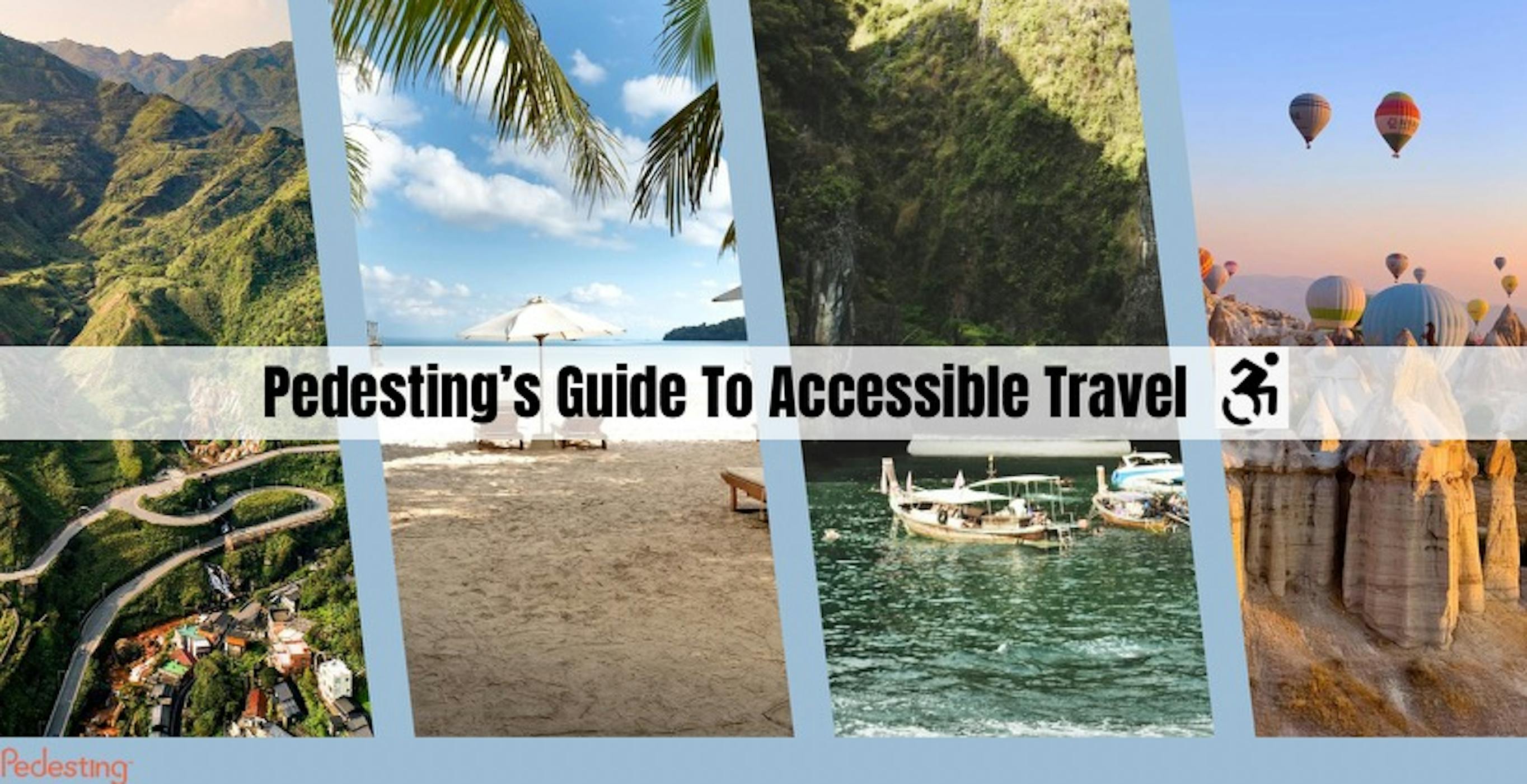
Accessible Travel: The Must Know Guide for A Vacation
Welcome to Pedesting’s guide on accessible travel!
Are you wondering how to travel with accessibility needs? As the holiday season is here, we understand the importance of inclusive and enjoyable vacations for individuals with mobility challenges. In this blog, we aim to provide must-know information to make your travel experiences memorable and hassle-free from the accessibility point of view.
This blog also has tips from our founder Nabeel Ramji that he follows on his holiday trips and travels around the globe. This blog will help you in discovering practical solutions on packing, travelling needs and other factors while considering your specific needs. Let’s dive in to our must know guide for accessible travel and a barrier free vacation.
Essential Travel Planning Tips:
Embarking on an accessible travel adventure requires thoughtful planning and research.
Begin with a thorough research on the place you are travelling to. When researching for an accessible destination it is good to remember the following factors:
· Check for the accessibility information: This includes ramps, elevators, accessible restrooms, reserved parking spaces and other facilities that meets your specific needs.
· Transportation: Look for accessible taxis, public transportation with wheelchair accessibility or private transportation services that can accommodate your mobility requirements.
· Restaurants and Dining: Explore restaurants with wheelchair-friendly entrances, accessible seating and menus that cater to your dietary needs.
· Medical Facilities: Research medical facilities and pharmacies in the destination and how accessible they are. Also carry an emergency medical pack or as suggested by your doctor.
To create a comprehensive itinerary that takes accessibility into account at every step, effective pre-trip communication is essential. This enables you to convey your specific needs and ensure a comfortable and inclusive travel experience. Some of the things to consider include:
1. Contact the service providers in advance before your trip and inform them of any requirements like mobility assistance, communication methods, medical requirements, wheelchair accessibility etc. This will provide them the time to arrange everything in advance.
2. Discuss transportation arrangements and accessibility features available in the hotel/ rentals.
3. Be clear about the cancellation polices and follow up once before you begin your trip.
Packing Smart for an Accessible Journey:
Packing for an accessible journey is all about preparedness and convenience. Here is a check list to consider:
· Medication and medical supplies: Keep them easily accessible in your luggage.
· Accessibility Aids: Explore a range of must-have mobility aids, from lightweight folding wheelchairs to portable ramps and assistive devices.
· Choose adaptive clothing that combines style with functionality, ensuring your comfort while on the go. Don't forget to pack accessories that enhance accessibility, such as travel-sized grab bars, waterproof seat covers, or portable hearing assistance systems.
· Keep a list of all important contact information, including emergency hotels, hotel, local healthcare facilities and accessible transportation services.
With these smart packing strategies, you'll be ready to embark on your accessible travel adventure.
Accessible Accommodations and Transportation:
Finding suitable accommodations and navigating transportation are pivotal aspects of accessible travel.
· As discussed above, check if your hotel rooms are wheelchair-accessible and ensure your rentals are barrier-free. Some of the other feature may include wider doorways, grab bars in bathrooms, roll-in showers, lowered counter tops etc.
· If you require a service animal, confirm the hotel’s policy regarding service.
· Explore smooth transportation options, including accessible air travel with reputable airlines, train journeys with accommodating services, and cruise lines that cater to mobility-challenged travelers.
Dining, Entertainment, and Experiences:
· Check with the restaurants if they offer accessible facilities and accommodate dietary considerations.
· When exploring a city/place, ensure if it caters to diverse accessibility needs, whether it's inclusive theater shows with accessible seats, accessible attractions with audio guides, or sensory-friendly events.
· For outdoor adventures have an option to explore guided tours designed to accommodate various mobility challenges.
Travel Insurance and Assistance:
Having the right travel insurance and assistance can make all the difference.
· Check if there is coverage available for medical emergencies, trip cancellation and baggage protection.
· Additionally, explore travel assistance programs designed to support disabled travellers. These programs offer valuable resources and services, including 24/7 emergency support, accessibility information, and personalized travel planning assistance."
How Does Our CEO Explore the World:
As someone with Cerebral Palsy himself, Pedesting’s CEO, Nabeel Ramji believes that everyone should be able to access and enjoy the world through travelling. He shares some of his fondest travel stories and tips below.
· One of the things I always recommend is to call the airlines before booking the tickets to check if their aircraft can accommodate the assistive devices like wheelchairs. Because some of the doors to the aircraft can be narrow especially the ones that fly to smaller cities.
· The other challenge I feel is, sometimes in the hotel rooms, the bed can be high, and it makes it difficult to transfer from the wheel chair to the bed. So, it is good check it beforehand with the hotel.
· Talking about accessible transit, I have always found that the express trains in Toronto and Vancouver are very accessible. It makes the journey easier and travel time lesser.
As we reach the end of the blog, we would like to conclude by highlighting the BBC’s article on “ Four cities putting disabled travellers first”. The article showcases how 4 prominent cities including Singapore and Sydney are making their cities accessible for different people with different impairments.
Some of the important techniques and solutions you will find in this article includes Disability trained officials, braille and sign language-based instructions in public platforms and entertainment areas and a site dedicated to accessibility to access the whole city.
We hope this guide on Accessible travel will help you to plan, prepare and enjoy a wonderful vacation without any barriers. Please share it with your circle and spread the word.

